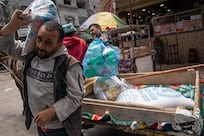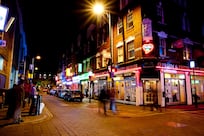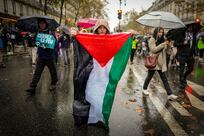The news that the United States Congress and some state governors are seeking to block Syrian refugees from entering the US has left me baffled and saddened. The language regarding refugees in America has changed dramatically in a short space of time. I should know. I am a Syrian who sought refuge in America.
In the wake of the recent attacks in Paris, waves of anger and condemnation spread from all corners of the world against the terror attack, throwing up different reactions towards the Syrian refugees. One unexpected reaction for me was the US refusal to take in Syrians who are escaping their country’s four-year-old civil war, for fear that ISIL terrorists will try to creep into the country posing as innocent refugees.
By a vote of 289 to 137, the House of Representatives passed a bill to put on hold even the relatively small number of Syrian refugees the United States had planned to admit – 10,000 next year – and require the FBI to certify that any refugee entering the US from Syria is not a threat. That requirement alone will add at least two years to the processing of any refugee.
This surprised me because I never thought that the US, which has in the past been a beacon for refugees, would now be the first country to reject them. I couldn’t fathom the idea that the rejection came from the same country that welcomed me in two years ago.
Early in 2012, I fled from Syria into Turkey, escaping the Syrian regime’s atrocities. I was fortunate enough to be offered help from both the Canadian and American embassies in Istanbul.
I ended up getting accepted for asylum in the US. When I finally arrived in America and found myself a new home in the deep south of Arkansas, I was so pleased by the friendly atmosphere. In the town of Fayetteville, I was welcomed with open arms by everyone I met, and I became part of the community in a matter of weeks.
I was astonished by the whole experience of living there. I can’t forget the extraordinary treatment from the family who offered me a room in their home, or the many car rides I was offered every day. How can I forget the heartwarming smiles and hellos everywhere I went, or the many invitations I received to visit homes and churches? They asked me to share my story and the stories of my people and I spoke gladly.
By contrast, last month I was shocked when the governor of the same state that welcomed me announced that Syrian refugees would not be welcome in Arkansas. What was even more shocking is to learn that I was the only Syrian refugee that was officially admitted and granted residency in that state.
Worse, the governor of neighbouring Tennessee announced that he wants refugees who have already been admitted to his state – and the whole of the United States – to be sent back to Syria.
The amount of hostility that has been shown toward refugees by the Republican presidential candidates in general, and by Donald Trump in particular, over recent weeks is deeply worrying. Mr Trump has made several outrageous remarks regarding refugees, calling them “Trojan horses” for terrorist groups and recommending the government start surveillance of mosques around the US.
But the most provocative remark of all was Mr Trump saying that, in response to the attacks in Paris, he would if elected president try to implement a database to keep track of Muslims in the United States and require them to register.
Additionally, most other Republican candidates have also called for a ban on all Syrian refugees. Not sparing a chance to be as offensive as Mr Trump, Ben Carson said they were analogous to “rabid dogs”, Chris Christie said he wouldn’t even admit Syrian toddlers, and Jeb Bush said he would admit only Syrian Christians.
I can be considered part of the first wave of Syrians to have fled the country since the 2011 uprising. As a journalist who was repeatedly detained and imprisoned for voicing my opposition to the Syrian regime, I was targeted by the Assad regime at the very start of the uprising and became a wanted man. I had to escape.
Back then there weren’t too many refugees yet. The uprising had not become a civil war and was not as devastating as it would later become.
Coming to “the land of the free” gave me the feeling of freedom I dreamt about. I found the kind of freedom that I needed the most as a journalist.
Having lived most of my life under a hostile regime, being deprived of even the minimum of human rights, I could not even voice my opinion without being harassed or threatened with being viciously silenced.
Many of the state governors who have spoken out against Syrian refugees have justified their views through security concerns. As a Syrian who, like many other Syrians, suffered from the lack of security, I am completely in favour of a security check on everyone who wants to enter the country. But that doesn’t mean it is possible to generalise the threat as coming from all refugees, or to paint them all with a single brush, or to say to all of these desperate people: “You are all a threat and need to stay out.”
The Arkansas’ governor’s reaction to refugees, and the many others who support the same position, all reflect a lack of information and understanding of the refugees crisis. Syrians are facing a catastrophe, a mass migration as a result of one of the worst wars in recent history.
In my opinion, rejecting refugees and justifying it because of a need to protect the country from terrorist attack is baseless. Not a single identified terrorist involved in the Paris attacks was a Syrian refugee, but the bullet was already fired and the judgment was already made. Eleven million displaced Syrian refugees have been labeled as terrorists by that decision.
Ironically, France, the country which was actually struck by terrorists, has decided not to give in to terrorist threats and agreed to welcome 30,000 more refugees. That highlights the shortsightedness of American politicians.
I still have confidence in America. Helping those in need is a core value of the country. And I hope I can remind people who oppose refugees in their home how hard and desperate the Syrians situation is. I think of the quote from the poet Warsan Shire: “No one leaves home unless home is the mouth of a shark.” If we judge refugees according to the worst stories we hear, we will always excuse human suffering, we will always say it is not yet as bad as it is elsewhere.
Omar Al Muqdad is an investigative journalist based in Washington, DC





